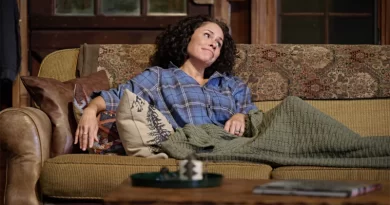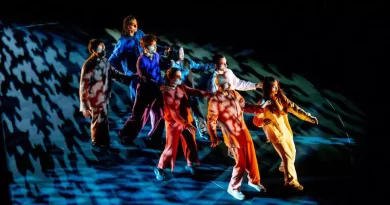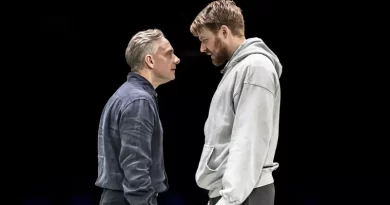“Hex” at National Theatre’s Olivier
Simon Jenner on the South Bank
23rd December 2022
Be careful what you call a musical, particularly would-be-catchy one-word titles like Twang!! or Mutiny! They seem sharply divided into hits and – often – misfires. Naming a show Hex was perhaps asking for trouble. Nonetheless, after it was cancelled before opening night a year ago due to Covid, Hex – from an idea by director Rufus Norris and Katrina Lindsay, with a book by Tanya Ronder, music by Jim Fortune, and lyrics by Norris – finally arrives at the National Theatre’s Oliver.
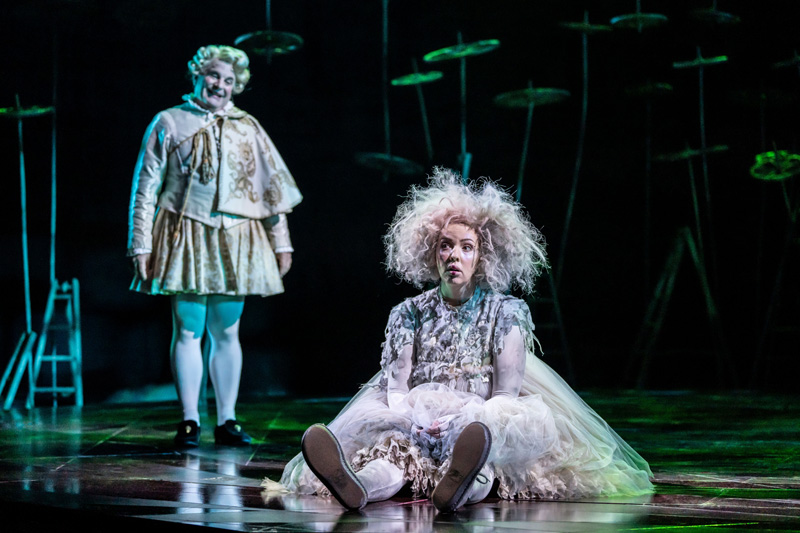
Michael Matus and Lisa Lambe.
Photo credit: Johan Persson.
The show has mostly been recast with exceptional leads, though with a shorter-than-usual run ending on 14 January. Oklahoma! it isn’t – Fortune’s music is attractive but apart from two numbers no more memorable than most recent musicals. Norris’s lyrics, though, are consistently satisfying. The band, with music arranged and supervised by Marc Tritschler, led by Tarek Merchant, is punchy but never overwhelming in Simon Baker’s sound. But there are two musical stand-outs and the concept, sketchy at the edges, is absorbing. There’s certainly room for Hex to grow in any revival.
In the history of NT productions, though, it can’t fail to leave a deep impression. Lindsay’s set is an uncluttered gleaming revolve with pop-ups and a castle that hollows into a bower. Her dazzling costume designs, mostly silk-pastel and folk-ochre, are brushed and strobed by the most beautiful lighting (from Paul Anderson) that I can remember seeing in this venue. Visually – together with Jade Hackett’s swirl of choreography – the show is stunning.
Basing Hex on the Sleeping Beauty tale, Ronder reaches back to some of that tale’s darker avatars, allowing her to enrich characters. Hoicked to court by one Smith (Michael Matus, a study in fusty, jerky servitude) to perform the required blessing, the much abused and harassed Fairy (Lisa Lambe) finally loses it with sleep-deprived and ragingly sleep-entitled Queen Regina (Neïma Naouri) and her ineffectually reasonable spouse King Rex (Kody Mortimer). They’re the first study in Ronder’s gritty way with parenthood, and it’ll return. When I say lose it Fairy does something that deprives her of magic and spends the show bluffing her way to truth.
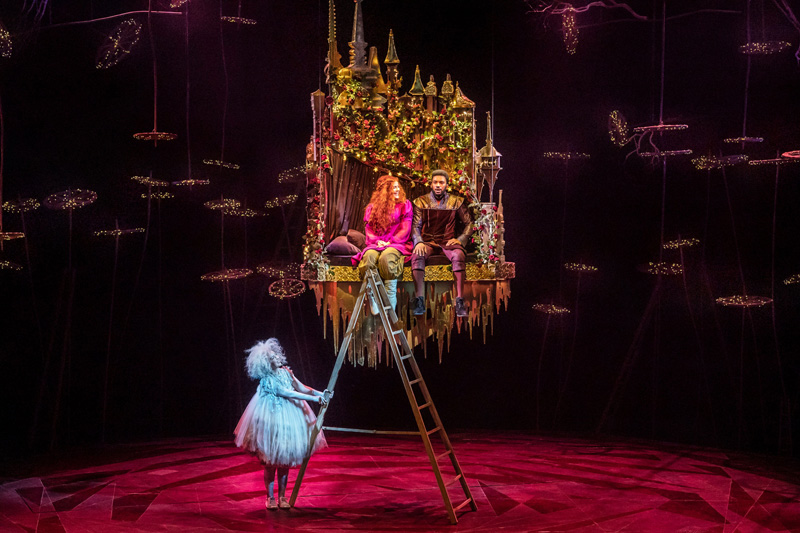
Lisa Lambe, Rosie Graham and Michael Elcock.
Photo credit: Johan Persson.
Fairy, who doesn’t have wings at all, is forced by Smith to fake them for court use, then metaphorically earn them in a heavy wink from It’s a Wonderful Life. Her superiors – Fairy is “low” – are naturally High Fairies (Kate Parr, Olivia Saunders, Rumi Sutton) who descend from the gods and sing gorgeously like a Richard Strauss trio of sopranos. They perform the role of would-be-omniscience like the three Gods in Brecht’s The Good Person of Szechwan – and with the same equivocal patronizing of the central character, here with a snobby curl of the lip.
Lambe is vocally incandescent. In “The One” – her generic, early “I Want” song – she establishes her soprano range with its complex register and tessitura. But it’s in the show’s crisis-point torch song “Above It All” that Lambe’s given the vocal stratosphere she metaphorically craves – and the sheer passion. The National have released it online and if that can’t hook you, with its heart-rending despair at attachment and looming tragedy, nothing can. It’s incomparably more moving in live performance.
Almost as strong, and at their best in testy parenthood, are Princess Rose (Rosie Graham) and Prince Bert (Michael Elcock). Graham first has to lose temper and consciousness, and after Elcock has released her we jump-cut to parenthood: twins, exhaustion and anxiety, as well as the little secret of Bert having an Ogre for a mother. Ronder’s far more interested in what the couple do after they’ve kissed and coupled. Graham, expressing stress and rage, is impressive both as a singer and as an actor, etching the shattering watchfulness of motherhood. Elcock impresses in the heedlessness of Bert – as well as his hurt innocence – dragging round a clutch of Princes who were similarly knocked out trying to wake up the Princess.
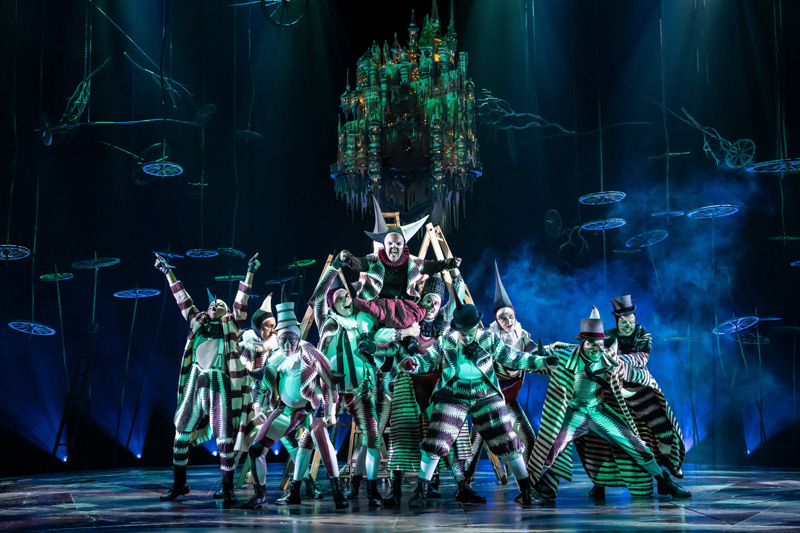
The ensemble.
Photo credit: Johan Persson.
That waking is expressed in a song that keeps popping up with delicious self-references. “Hello … Hi” is the wittiest number here, first syncopated with surprise and sexual awkwardness, then excitement. It’s like a vocal hesitation waltz. On its return it’s chorused first by those knocked-out but now lovelorn Princes; then by that first really awkward meeting with the Mother-in-Law who hadn’t quite realized her moonlighting son was married, let alone co-parent of twins. Aren’t they delicious though?
Queenie (Victoria Hamilton-Barritt) is the other big reason to see this show. Persuaded not to eat her human child by Fairy who’s already done 84 years watching over Rose, she clearly has urges and, when species collide, they do so with heat – particularly oven mark 5. If “I Know What I Am” is a homage to “I Am What I Am” in La Cages aux Folles, with a nod to Sondheim’s Sweeney Todd, it’s effective: a paean to cannibalism and dark natures everywhere. Hamilton-Barritt, acclaimed in Lloyd Webber’s Cinderella, here shows what a voice with a smoky rich mezzo and huge range can do – pummelling pain and isolation out of Norris’s nailing lyrics. She gets almost as much fun out of “Feed Me” with Queenie’s assembled Staff – again I feel a homage coming on.
We’ve skipped over that waking part though. Bert’s peeping Ogre blood protects him from a Camden-grown outburst of cockney Thorns led by Bruiser Thorn (Mark Oxtoby) singing with the gravelly assurance of Suggs. Fortune’s Madness-infused ska and reggae provides the obligatory comic turn, and his Thorns (the protean, ever costume-shifting ensemble) are appropriately knockabout and wannabe knockouts.
There’s occasional sketchy development, as in many musicals, which here at two and a half hours limits room to round them off; but that might yet happen. Despite this, Ronder has memorably redrawn that tricky problem of in-laws, with a diversity of appetites appeased or altered. In particular she addresses the whole question of what Beauty, or Rose, does after she wakes, including choosing to experience her mother’s sleeplessness differently; Graham’s morphing Rose into every young woman confronted with monsters is affecting.
Indeed, it’s choices the leads make that define this show. Hamilton-Barritt’s Queenie can be touched by fallible magic, and Lambe’s magnificent Fairy, finding love in herself, through that touches everyone else. A beguiling, wintry marvel, semi-precious.
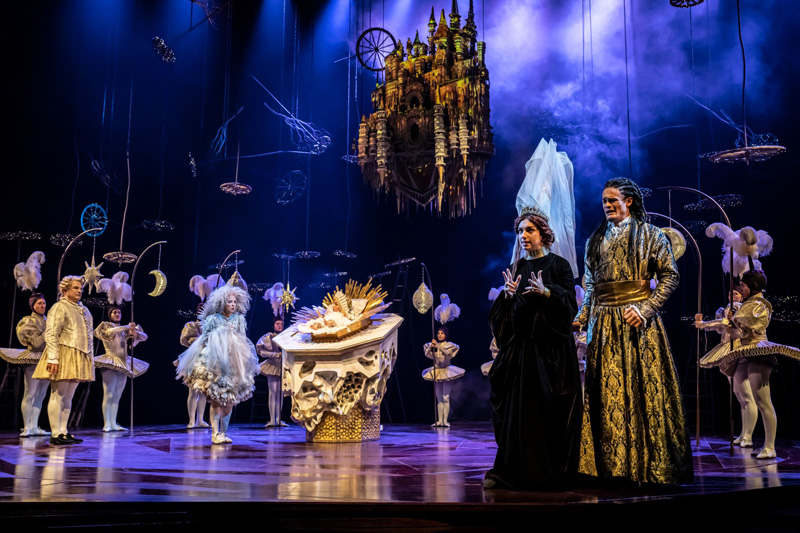
The ensemble.
Photo credit: Johan Persson.





